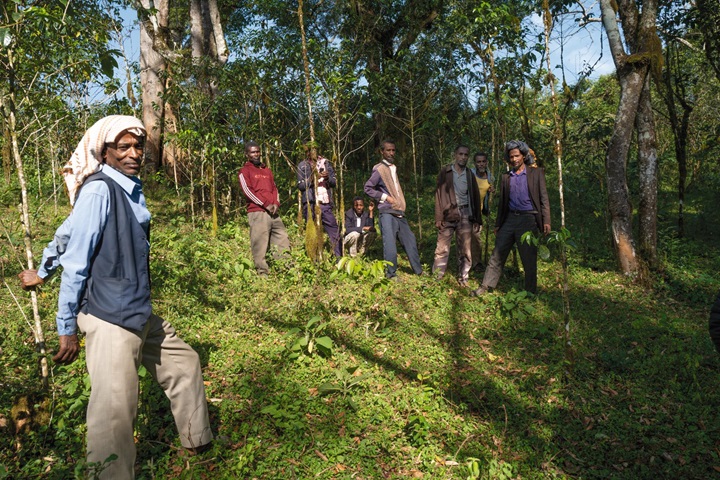Monthly Highlights of Research Activities: March 21 is the International Day of Forests
2025.03.18

(Photo: JICA/ Hasui Mikio)
March 21 marks the United Nations’ International Day of Forests —a reminder that forests are the lifeline of our planet. They provide food and resources, shelter countless species, and maintain the delicate balance of biodiversity that sustain life on Earth. Protecting forests isn’t just about saving trees—it’s about securing the future of all living beings, including ourselves. Every year on this day, efforts are made all around the world to raise awareness about the critical role forests play in sustaining life.
One example of how forests directly support both nature and people can be found in Ethiopia, where coffee was originally discovered. Have you heard of “Forest Coffee”? This refers to coffee that naturally grows in Ethiopia’s forests. For years, JICA has been working to improve the quality and sales of forest coffee, and helping local communities to sustainably manage their forests at the same time.
As part of these efforts, JICA carried out the Participatory Forest Management Project in Belete-Gera from 2003 to 2013. Protecting forests requires improving the livelihoods of the people who live there. So, JICA implemented a range of initiatives, including establishing participatory forest management associations, running Farmer Field Schools to enhance agricultural productivity, and increasing income through forest coffee sales. Here are some of the research findings the JICA Ogata Sadako Research Institute for Peace and Development produced based on the project.
Click on the link below for more information on JICA’s project in Ethiopia.
This study uses remote sensing data to quantitatively examine the impact of establishing participatory forest management associations in Ethiopia.
This study examines the impact of the shade coffee certification program on forest conservation. The results suggest that the certification program has had a large impact on forest protection, decreasing the probability of deforestation.
We have published other research findings related to forest conservation.
Despite the importance of ecosystem services that forests provide for human beings, their diverse values have scarcely been evaluated economically. This study created a comprehensive accounting of forest values in Ethiopia, using a welfare-economic framework to evaluate changes in the value of forests as natural capital.
Earth observation satellites play a crucial role in the efforts for deforestation control. While optical satellite data has inherent shortcomings in detecting deforestation, Japan’s Advanced Land Observing Satellite-2 or ALOS-2 radar satellite can detect 1.5 to 10 times more deforestation than optical satellites can during the rainy season. In this blog Yamada Eiji
, senior research fellow at the JICA Ogata Research Institute, and his colleagues, demonstrate the effectiveness of radar satellites as a preventive and mitigating measure against illegal deforestation.
This blog is based on Chapter 8 of an open-access book titled, “Breakthrough: The Promise of Frontier Technologies for Sustainable Development
” produced through joint research with the Brookings Institution.

事業事前評価表(地球規模課題対応国際科学技術協力(SATREPS)).国際協力機構 地球環境部 . 防災第一チーム. 1.案件名.国 名: フィリピン共和国.

事業事前評価表(地球規模課題対応国際科学技術協力(SATREPS)).国際協力機構 地球環境部 . 防災第一チーム. 1.案件名.国 名: フィリピン共和国.

事業事前評価表(地球規模課題対応国際科学技術協力(SATREPS)).国際協力機構 地球環境部 . 防災第一チーム. 1.案件名.国 名: フィリピン共和国.

事業事前評価表(地球規模課題対応国際科学技術協力(SATREPS)).国際協力機構 地球環境部 . 防災第一チーム. 1.案件名.国 名: フィリピン共和国.

事業事前評価表(地球規模課題対応国際科学技術協力(SATREPS)).国際協力機構 地球環境部 . 防災第一チーム. 1.案件名.国 名: フィリピン共和国.